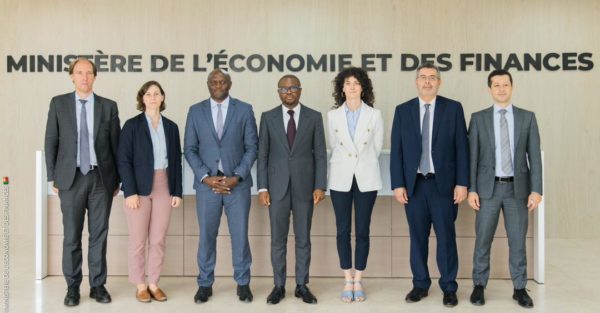IMF and the Republic of Benin reached a staff agreement on a new programme under the Resilience and Sustainability Facility and the third review under the Elargi Credit Facility and the Elargy Credit Facility

The end-of-mission press releases contain statements by IMF teams that report on their preliminary findings after their country visit. The views expressed in this statement are those of the IMF staff and are not necessarily those of the Executive Board.
The Beninese authorities and the IMF team reached a service-level agreement on a new programme under the Resilience and Sustainability Facility (FRD) and the conclusion of the third review of the Elargi Credit Facility (MEDC) and the Elargy Credit Facility (ECF).
The draft budget law for 2024 submitted to Parliament is in line with the authorities' objective of converging towards the Community budget deficit standard of 3% of GDP by 2025, supported by revenue mobilisation.
Benin is facing two major major shocks in connection with the closure of the Niger border, the sharp rise in fuel prices in Nigeria and the depreciation of the naira. The Beninese authorities should remain vigilant with regard to the socio-economic and financial implications of these developments.
Washiington.. A team from the International Monetary Fund (IMF), led by Mr. Constant Lonkeng, visited Cotonou from 17 to 26 October 2023, to hold discussions on the third review of Benin's programme, which IMF supports under the Elargi Credit Facility (MEDC) and the Financial Credit Facility (ECF) and a new programme under the Resilience and Sustainability Facility (FRD).
At the end of the mission, Mr. Lonkeng made the following statement:
“I am pleased to announce that the IMF has reached a service-level agreement with Benin on a new programme under the Resilience and Sustainability Facility (FRD) and on the country’s commitments that would allow the conclusion of the third review under the ongoing MEDC/CEF Joint Agreement. The FRD aims to support Benin’s ambitious climate action, complementing MEDC/FEC in building socio-economic resilience in the country. This service agreement is subject to the approval of the IMF’s senior management and its Executive Board. Following the conclusion of the MEDC/FEC review, SDR 101.59 million, or 82% of Benin’s share (approximately USD 134 million), will be disbursed to the State budget.”
“After a dynamism of economic activity in the first half of the year, Benin is facing two major shocks related to the closure of the border with Niger following regional sanctions on that country and some economic policy changes following the elections in Nigeria. Economic activity is expected to increase by 5.6 per cent this year (compared to 6 per cent previously), reflecting ongoing shocks. Growth prospects are prone to significant risks, including a prolonged closure of the border with Niger, tighter financing conditions and the advent of weather shocks."
“The performance under the programme is robust – all quantitative targets by the end of June 2023 have been met, with ongoing fiscal consolidation. The authorities have mobilised additional concessional budgetary support, which will make it possible to use the flexibility margin provided for in the programme, including a somewhat higher level of budget deficit. The draft budget law 2024 submitted to Parliament is in line with the authorities’ objective of converging towards the Community standard for the 3% of GDP budget deficit by 2025. Beyond the gradual lifting of crisis measures in previous years, the consolidation of medium-term public finances will be driven by the recently developed medium-term revenue mobilisation strategy (MTRS)."
“The structural reform programme has made significant progress. The mission stressed the need to speed up the process of consulting civil society on the action plan to follow up on the recommendations of the IMF’s governance diagnosis, which has lagged behind, even though some recommendations are already being implemented. Structural benchmarks under the MEDC/FEC programme are being extended to support the authorities' ongoing efforts to strengthen the anti-money laundering and anti-terrorist financing (CFT/CFT) system, transparency and business climate."
“The new 24-month DSF builds on Benin’s strong legal and institutional foundations for climate action, the IMF and World Bank diagnoses, and contributions from the Global Centre for Adaptation (GCA). Reform measures under the DRF are based on four main pillars: 1) systematically addressing climate issues in the conduct of public policy; 2) supporting adaptation to climate change, in particular through building resilience at Community level and establishing pro-climate social protection schemes; 3) reducing transition risks, including through a comprehensive reform of energy subsidies; and 4) mobilising private financing for climate action. The implementation of the DSF will require close collaboration between the various agencies involved. The biannual reviews under the DRF will be aligned with those of the ECDF."
“The team met Mr. Wadagni, Minister of State, Minister of Economy and Finance, Bio-Tchané, Minister of State for Development and Coordination of Government Action, Dagnon, Special Adviser to the President of the Republic, Mr. Detchenou, Keeper of the Seals, Minister of Justice and Legislation , Assilamehoo, National Director of BCEAO, General Bada, Director of the Military Cabinet of the President of the Republic, senior officials of the Benin administration, civil society, opposition parties (Democrats and FCBE), trade unions, students, lenders, regional and multilateral development banks as well as the association of banks and other representatives of the private sector.
“The IMF team would like to thank the Beninese authorities and various stakeholders for their cooperation and fruitful exchanges during the mission. ”

